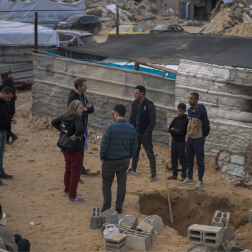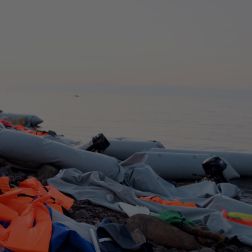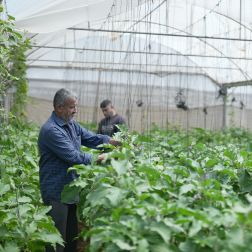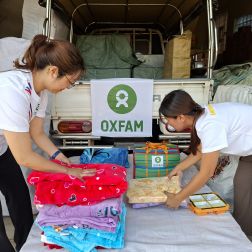- 5 mins read time
- Published: 6th September 2018
August, the cruellest month in Yemen - Oxfam
An IDP from Hodeidah in Abs district, Hajjah governorate.Credit: Oxfam In Yemen: Ahmed Al-Fadeel • 300 children amongst almost 1,000 civilian casualties of the carnage• Oxfam calls for war criminals to be held to account, as peace talks start in Geneva August has been the bloodiest month this year for civilians in Yemen with 981 innocent people killed or injured, including over 300 children. Almost half of these casualties, including 131 children, were wounded or lost their lives in the first nine days of August alone, according to the UN’s civilian impact monitoring department. These reports, gleaned from open sources, are not likely to have captured all civilian casualties and make for sickening reading: 16 fishermen killed and four missing following an airstrike, a woman killed by sniper fire, two children killed by cluster bombs; schools, homes, farms attacked and many more instances of innocent families hit. The devastating numbers are due to warring parties’ reckless disregard for civilian lives and the failure of their political backers to offer any action to prevent the carnage, Oxfam said today, ahead of Yemen peace talks in Geneva. According to the UN between 26 March 2015 and 9 August 2018 there were a total of 17,062 civilian casualties in Yemen. The majority of these casualties, 10,471, were as a result of Saudi-led coalition airstrikes. Meanwhile the Houthis and other armed groups continue their stranglehold in Taiz and other areas where street fighting and the use of landmines is leading to civilian casualties, and lack of access means people are denied humanitarian assistance. Speaking ahead of the first talks in two years to try to secure peace between the Saudi-backed forces and Houthi rebels, Oxfam Ireland’s Chief Executive Jim Clarken said: “As parents across the island of Ireland began to think about back-to-school and buying uniforms in August, the parents of hundreds of children in Yemen buried their beloved sons and daughters, recklessly killed in a conflict that is destroying the lives of millions of Yemenis. “Yemen is now a free-fire zone where people gathering for weddings, burying their loved ones or going to market are risking their lives every day. The suffering of the people of Yemen is an affront to our shared humanity and a failure of powerful countries to uphold any sense of the values they are fond of espousing. “It is a shameful chapter of diplomatic double speak, underhand dealings and downright hypocrisy. All warring parties have committed, and continue to commit, violations of the rules of war. The perpetrators and those who are actively involved need to be brought to account and the Irish and UK governments can play their part by continuing to press for international action to end the conflict. “Ending the killing of civilians needs to be a priority for all parties and communities in Yemen. Today’s talks in Geneva offer them an opportunity to draw a line in the sand and end the carnage.” Despite assurances that there was a ‘pause’ in the fighting around the port city of Hudaydah the beginning of August saw deadly mortar attacks on a busy market killing 41 civilians, including six children and four women, and injuring another 111 civilians. There was also a mortar attack on a hospital in the city causing many civilian casualties. On 9 August, a market and a bus full of school children was bombed killing 46 people and leaving 100 casualties. Most of the dead were boys under the age of 13 years old. Later in the month at least 22 children and four women were killed by an airstrike as they fled a previous attack the day before. Aid agencies are finding it difficult to help people because of the fighting and blocked roads. Damage to water and sanitation infrastructure in Hudaydah and other parts of the country is denying thousands of people access to water, and increasing the threat of a third cholera wave. Oxfam has been in Yemen since 1983. Since 2015, Oxfam has reached more than 2.8 million people in nine governorates of Yemen, providing water and sanitation services – including as part of a cholera response to prevent and contain the disease. Oxfam is also trucking water as well as providing cash assistance and food vouchers. ENDS Spokespeople are available in the region and in Ireland. For more information or to arrange an interview please contact: REPUBLIC OF IRELAND: Alice Dawson-Lyons, Oxfam Ireland, on +353 (0) 83 198 1869 / alice.dawsonlyons@oxfam.org NORTHERN IRELAND: Phillip Graham on 0044 (0) 7841 102535 / phillip.graham@oxfamireland.org NOTES TO EDITORS: The figures collated by the UN’s civilian impact monitoring department come from open sources and have not been verified. They are collected on a daily basis and shared with UN agencies and NGOs. A recent joint UN Development Programme Early Recovery Assessment showed how life has deteriorated for people across the board in last three years of the conflict, people are becoming poorer, many have lost incomes and are reliant on casual labour or aid, many cannot afford to buy food, and face difficulties accessing food, water, health and education. Last week’s UN Group of Experts report shows a pattern of violations and potential war crimes committed against civilians by Saudi Arabia and the United Arab Emirates, and by the Houthis over the last three years, including a punishing air and naval blockade, attacks on residential areas, schools and medical facilities, and arbitrary arrests.




